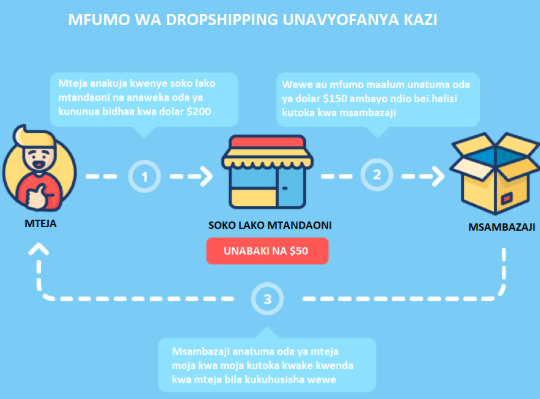Table of Contents
ToggleDropshipping in Tanzania – Can You Really Make Money Without Hassle?
Imagine running your own online store from the comfort of your home in Dar es Salaam, selling products without ever holding physical stock. Sounds like a dream—right? That’s exactly what dropshipping promises. But amidst Tanzania’s quirks of internet coverage, logistics, and payment systems, is dropshipping truly a hassle-free way to make money? Let’s break it down in warm, real-talk style.
1. What Is Dropshipping Anyway—and Why It’s Tempting
In a nutshell, dropshipping is an e-commerce model where you don’t hold stock. Instead, when someone places an order in your store, your supplier ships it directly to the customer. You handle marketing and customer service, while someone else deals with storage and shipping. It’s light on startup cost—perfect for budding entrepreneurs. WikipediaInvestopedia
Reddit users often praise the low-risk nature of dropshipping:
“One of the biggest hurdles… is the large upfront investment… Dropshipping completely removes this barrier.” Reddit
2. Tanzania: A Land of Opportunity… With a Few Hiccups
Why we have hope:
-
Mobile money is everywhere: Over half of Tanzanians use mobile money—great for collecting payments. Ticgl
-
Young, digital-savvy population: With time, online habits are growing. GSMATicgl
-
Government is supporting E‑commerce infrastructure: Initiatives like improved addressing systems aim to help logistics. globalunbounded.com
But here’s what keeps entrepreneurs up at night:
-
Low internet penetration (~45%): Not everyone is online or shopping digitally yet. TicglGSMA
-
Poor logistics and addressing systems: Deliveries can be slow and confusing—decoding “Mtaa wa Pili” remains real. GSMAglobalunbounded.com
-
Low trust in e-commerce: COD dominates, since buyers worry about scams and uncertain quality. globalunbounded.com
-
Few big e-commerce players now: Platforms like Jumia have exited, shrinking infrastructure. GSMA
So yes, there’s promise—but with caveats.
3. Why Dropshipping Can Still Work — With the Right Moves
Dropshipping remains attractive because of low startup cost, flexibility, and scaling potential. Investopedia+1 Many success stories globally, like Maddy Glynn earning £80k/month with minimal overhead, prove it’s possible—when done right. The Sun
In Tanzania, local suppliers can be a game-changer:
-
Faster shipping, lower costs, better communication, easier returns, and customer trust. kickstartdropshipping.com
-
For example, Seasonsway in Dar es Salaam offers seamless integrations, wholesale products, express shipping (7–14 days), and support—making dropshipping much smoother here. seasonsway.com
4. Getting Paid: Payment Gateways That Actually Work
One of the trickiest parts in Tanzania is getting paid. Traditional options like Stripe don’t always play nice. However…
Redditors share their experiences:
“Pesapal (Kenya)… business was doing well despite losing payments due to poorly made gateway.” Reddit
“Try ClickPesa, Tiger, DPO… ClickPesa is like Pesapal; Tiger charges ~10% commission.” Reddit
Another user points out alternatives like Flutterwave and Payoneer:
“Freelancing… payments can be received through international methods like Payoneer. E‑Commerce… Jumia or Shopify dropshipping.” Reddit
Summary: Use gateways like DPO, ClickPesa, or Pesapal, especially for shoppers outside Tanzania. Or list on platforms like Shopify while linking via a checkout solution like Selar.com—which can send you payment links directly. Reddit
5. Step-by-Step: Your Hassle-Minimized Dropshipping Plan
Here’s a simplified roadmap to get started without losing your mind:
-
Pick a smart niche: Choose products that resonate locally and have demand—think unique crafts, eco-friendly items, or fashion. Afriqaaa – Get Used To It
-
Register your business: Go through BRELA, get your TIN, and open a business bank account—credibility matters. Afriqaaa – Get Used To It
-
Choose your supplier: Preferably a local or regional one (like Seasonsway). Reliable shipping and communication are key.
-
Build your store: Use Shopify, WooCommerce, or Wix—ensure it’s mobile-friendly with clear product descriptions and images.
-
Integrate payments: Set up a payment gateway like ClickPesa, DPO, or Pesapal. If targeting diaspora customers, consider Payoneer payout.
-
Market like a pro: Use TikTok, Instagram, Facebook, even WhatsApp groups. Leverage influencers, run ads, and post “how it’s made” stories.
-
Deliver with care: Be transparent about shipping times. Include tracking, offer COD carefully, and handle returns gracefully.
-
Support your customers: Fast responses, clear policies, and personalized touch go a long way.
6. Real Talk: Challenges & How to Navigate Them
-
Thin margins, steep competition: Dropshipping isn’t a money tree—profit comes from volume. Investopedia+1
-
Logistics are spotty: Prioritize reliable suppliers and consider localized shipping for efficiency.
-
Earning takes time: As one Tanzanian put it, it may take 1–2 years to become self-sufficient. Reddit
-
Stay customer-focused: Build trust to overcome skepticism—great support, quality products, and transparency go a long way.
7. Why You Should Still Consider It
-
Low startup cost—perfect for students or young professionals.
-
Scalable and flexible—run it from anywhere, anytime.
-
Skill-building—marketing, customer service, business operations.
-
Local advantage—you understand Tanzanian culture, trends, and pain points. Use that!
8. Final Thoughts—Is Dropshipping in Tanzania Worth It?
Yes, you can make money with dropshipping in Tanzania—and yes, it can be relatively hassle-free if you build smart. But it’s not a passive “get-rich-quick” scheme. It requires:
-
Accurate planning
-
Choosing the right partners
-
Strong marketing
-
A focus on trust and service
Pair that with rising mobile money adoption, improving policy environment, and an entrepreneurial nation—what you’ll get is not perfection, but potential.
So, if you’re serious: start small, iterate fast, support customers well, and evolve with the market.








